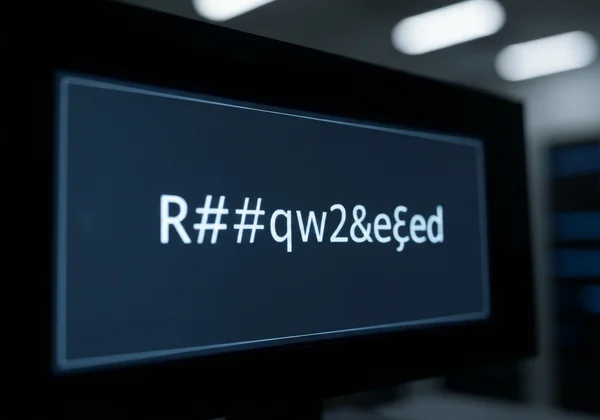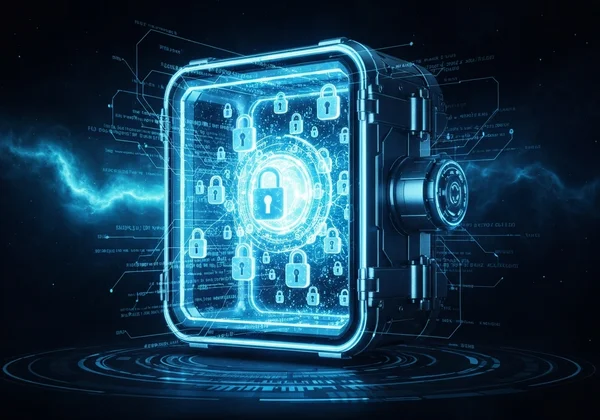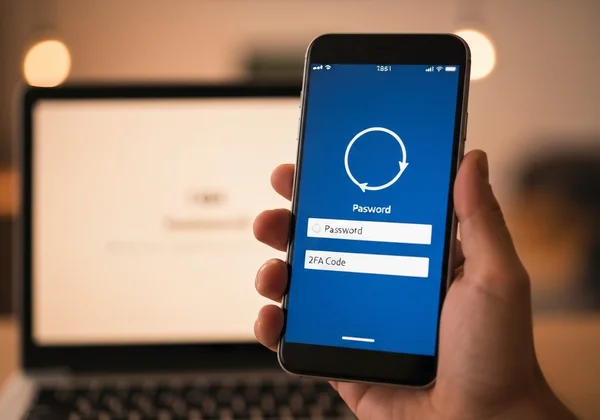مولد رمز عبور: گامهای بعدی شما در مدیریت امن
خب، شما به تازگی از یک مولد رمز عبور آنلاین برای ساخت یک رمز عبور طولانی، تصادفی و فوقالعاده قوی استفاده کردهاید. تبریک میگویم! این گامی بزرگ و اساسی در جهت ایمنسازی زندگی دیجیتال شماست. اما اکنون با چالش جدیدی روبرو هستید: پس از تولید رمز عبور، چه باید کرد؟ رمز عبور قدرتمند، تنها در صورتی مؤثر است که به درستی مدیریت شود. صرفِ ایجاد آن، برای حفظ امنیت حسابهای شما کافی نیست.
این راهنما شما را گام به گام در مراحل ضروری مدیریت امن رمز عبور راهنمایی میکند. ما نحوه ذخیرهسازی ایمن اطلاعات ورود پیچیده جدیدتان، استفاده مؤثر از آنها در حسابهای مختلف و ارتقاء امنیت کلی آنلاین شما را پوشش خواهیم داد. ایجاد یک رمز عبور امن با ابزاری مانند مولد رمز عبور آنلاین ما شروعی عالی است؛ اما تسلط بر مدیریت آن، رمز موفقیت شماست.
روشهای امن ذخیره رمز عبور جدید
شما یک رمز عبور مانند n$tG@8!zP#qWv2&e تولید کردهاید که برای امنیت عالی است، اما به خاطر سپردن آن برای مغز انسان بسیار دشوار است. پس چگونه آن را به طور امن ذخیره میکنید؟ این سؤال فوری و مهمترین است. روشی که برای ذخیره رمز عبور خود انتخاب میکنید، به اندازه قدرت خود رمز عبور اهمیت دارد. یک رمز عبور غیرقابل نفوذ که روی یک یادداشت چسبان روی مانیتور شما نوشته شده باشد، دیگر غیرقابل نفوذ نیست.
هدف شما یافتن یک روش ذخیرهسازی است که هم در برابر تهدیدات خارجی امن باشد و هم برای استفاده شما کاربرپسند باشد. بیایید بررسی کنیم که چرا عادتهای قدیمی دیگر کافی نیستند و راه حل مدرن و استاندارد صنعتی را برای ایمن نگه داشتن اطلاعات ورود شما معرفی کنیم.

چرا روشهای سنتی برای رمزهای عبور قوی کافی نیستند
برای سالها، مردم به روشهای سادهای برای مدیریت اطلاعات ورود خود متکی بودند. حتی ممکن است شما هم اکنون از برخی از آنها استفاده کنید. با این حال، هنگام کار با رمزهای عبور قوی که برای حداکثر امنیت تولید شدهاند، این تکنیکهای سنتی نه تنها کاربردی نیستند، بلکه به طرز خطرناکی ناامن نیز هستند.
روشهای رایج اما معیوب عبارتند از:
- حفظ کردن: این کار برای رمزهای عبور منحصر به فرد و پیچیده برای دهها حساب مختلف به سادگی عملی نیست. تلاش برای انجام این کار اغلب منجر به استفاده از رمزهای عبور سادهتر، آسانتر برای به خاطر سپردن (و در نتیجه ضعیفتر) میشود.
- یادداشتهای چسبان یا دفترچهها: یادداشتهای فیزیکی ممکن است گم شوند، به سرقت بروند یا توسط هر کسی که دسترسی فیزیکی به میز یا فضای کاری شما دارد، دیده شوند.
- فایلهای دیجیتال رمزگذاری نشده: ذخیره رمزهای عبور در یک فایل متنی ساده، یک سند Word یا یک صفحه گسترده روی کامپیوتر شما یک خطر بزرگ است. اگر دستگاه شما توسط بدافزار آلوده شود یا به سرقت برود، مهاجمان میتوانند به راحتی به این فایل دسترسی پیدا کرده و کلیدهای کل قلمرو دیجیتال شما را به دست آورند.
چنین روشهایی به طور کامل مزایای امنیتی را که از استفاده از یک مولد رمز عبور به دست میآورید، بیاثر میکنند.
نقش یک مدیر رمز عبور در مدیریت رمز عبور
راه حل قطعی برای مشکل ذخیرهسازی، یک مدیر رمز عبور است. آن را به عنوان یک گاوصندوق دیجیتال بسیار امن برای تمام اطلاعات ورود به سیستم خود در نظر بگیرید. به جای تلاش برای به خاطر سپردن صدها رمز عبور پیچیده مختلف، شما فقط باید یک رمز عبور را به خاطر بسپارید: رمز عبور اصلی برای باز کردن گاوصندوق خود.
یک مدیر رمز عبور، مشکلات روشهای سنتی را به شرح زیر حل میکند:
- امنیت دادههای شما: رمزهای عبور ذخیره شده شما را با استفاده از الگوریتمهای قدرتمند (مانند AES-256) رمزگذاری میکند و آنها را برای هر کسی بدون رمز عبور اصلی غیرقابل خواندن میکند.
- ذخیرهسازی جامع: میتواند صدها یا هزاران رمز عبور، یادداشتهای امن، جزئیات کارت اعتباری و سایر اطلاعات حساس را ذخیره کند.
- سادهسازی ورود به سیستم: با مرورگر وب و دستگاههای تلفن همراه شما یکپارچه میشود تا به طور خودکار نام کاربری و رمز عبور شما را در وبسایتها و برنامهها پر کند.
استفاده از یک مدیر رمز عبور به شما این امکان را میدهد که برای هر حساب کاربری خود از یک رمز عبور منحصر به فرد و قوی استفاده کنید، بدون اینکه بار به خاطر سپردن آنها را به دوش بکشید. این یک مکمل عالی برای یک ابزار مولد رمز عبور رایگان قوی است.

ویژگیهای ضروری که باید در یک مدیر رمز عبور به دنبال آنها باشید
همه مدیران رمز عبور یکسان نیستند. هنگام انتخاب یکی، چندین ویژگی ضروری وجود دارد که باید به دنبال آنها باشید تا از بهترین محافظت و راحتی اطمینان حاصل کنید.
- معماری بدون دانش (Zero-Knowledge Architecture): این بسیار مهم است. به این معنی است که شرکت مدیر رمز عبور نمیتواند به دادههای ذخیره شده شما دسترسی پیدا کند، آنها را مشاهده یا رمزگشایی کند. فقط شما، با رمز عبور اصلی خود، میتوانید گاوصندوق خود را باز کنید.
- رمزگذاری قوی: به دنبال خدماتی باشید که از رمزگذاری استاندارد صنعتی AES-256 بیتی استفاده میکنند. این به عنوان استاندارد طلایی در نظر گرفته میشود و توسط دولتها و موسسات مالی استفاده میشود.
- احراز هویت دو مرحلهای (2FA): بهترین مدیران رمز عبور به شما اجازه میدهند که گاوصندوق خود را با 2FA محافظت کنید و یک لایه امنیتی اضافی به مهمترین حساب شما اضافه کنید.
- همگامسازی بین پلتفرمی: مدیر انتخابی شما باید به طور یکپارچه در تمام دستگاههای شما، از جمله کامپیوتر، تلفن هوشمند و تبلت، کار کند و اطمینان حاصل کند که همیشه رمزهای عبور خود را در زمان نیاز در اختیار دارید.
- ممیزی سلامت رمز عبور: بسیاری از مدیران رده بالا شامل یک ویژگی هستند که رمزهای عبور ذخیره شده شما را تجزیه و تحلیل میکند و هر رمز عبوری را که ضعیف، تکراری یا در نقضهای داده شناخته شده افشا شده باشد، پرچمگذاری میکند.
استفاده از رمز عبور قوی جدید و بهترین شیوهها
با وجود یک راه حل ذخیرهسازی امن، وقت آن است که رمزهای عبور تازه تولید شده خود را به کار بگیرید. اینجاست که استراتژی امنیتی شما واقعاً جان میگیرد. پیروی از این بهترین شیوهها تضمین میکند که از تمام قدرت اطلاعات کاربری قوی و منحصر به فرد خود بهره میبرید. اکنون که یک روش امن دارید، میتوانید با اطمینان برای هر سرویس آنلاین رمز عبور تولید کنید.
اولویتبندی حسابهای شما برای امنیت حساب
شما احتمالاً دهها، اگر نگوییم صدها، حساب آنلاین دارید. تغییر همزمان هر رمز عبور میتواند طاقتفرسا باشد. برای مدیریت مؤثر این کار و به حداکثر رساندن امنیت حساب خود، بهروزرسانیهای خود را بر اساس سطوح اهمیت اولویتبندی کنید.
- سطح ۱ (اولویت فوری): با مهمترین حسابهای خود شروع کنید. این شامل آدرس ایمیل اصلی شما (که اغلب برای بازنشانی رمز عبور سایر حسابها استفاده میشود)، بانکداری آنلاین و خدمات مالی، و رمز عبور اصلی مدیر رمز عبور جدید شما میشود.
- سطح ۲ (اولویت بالا): در مرحله بعد، سایتهای بزرگ تجارت الکترونیک که اطلاعات پرداخت شما در آنها ذخیره شده است (مانند آمازون)، پروفایلهای اصلی رسانههای اجتماعی شما و هر حساب مرتبط با کار که حاوی دادههای حساس است را بهروزرسانی کنید.
- سطح ۳ (اولویت عمومی): در نهایت، به ترتیب حسابهای کمتر حیاتی، مانند انجمنهای آنلاین، خبرنامهها و خدمات سرگرمی را بهروزرسانی کنید.
این رویکرد لایهای تضمین میکند که با ارزشترین داراییهای شما ابتدا محافظت میشوند و خطر کلی شما را به سرعت و کارآمدی کاهش میدهد.
قانون طلایی: رمزهای عبور منحصر به فرد برای هر حساب
مهمترین قانون بهداشت رمز عبور، استفاده از رمزهای عبور منحصر به فرد برای هر حساب آنلاین است. مجرمان سایبری اغلب از تکنیکی به نام "تزریق اعتبارنامه" استفاده میکنند، جایی که لیستی از نامهای کاربری و رمزهای عبور را از یک نقض داده گرفته و آنها را در وبسایتهای دیگر امتحان میکنند. اگر رمزهای عبور را مجدداً استفاده کنید، یک نقض در یک انجمن با امنیت پایین میتواند به مهاجم دسترسی به ایمیل یا حساب بانکی شما را بدهد.
به همین دلیل است که یک مولد رمز عبور بسیار حیاتی است. این به شما امکان میدهد تا بدون زحمت یک رمز عبور کاملاً متفاوت و تصادفی برای هر سایت ایجاد کنید. مدیر رمز عبور شما ذخیره و استفاده از آنها را آسان میکند و هرگونه وسوسه برای بازگشت به عادت خطرناک استفاده مجدد از رمز عبور را از بین میبرد. این را یک قانون قرار دهید: حساب جدید، رمز عبور جدید از یک مولد رمز عبور قوی.

استفاده یکپارچه از رمزهای عبور تولید شده شما با تکمیل خودکار
یکی از بزرگترین مزایای یک مدیر رمز عبور، راحتی تکمیل خودکار است. پس از راهاندازی، افزونه مرورگر یا برنامه موبایل مدیر رمز عبور شما فیلدهای ورود به سیستم را در وبسایتها و برنامهها تشخیص میدهد. با یک کلیک، نام کاربری و رمز عبور قوی صحیح را برای آن سایت خاص پر میکند.
این ویژگی فراتر از صرفهجویی در وقت شماست. همچنین شما را در برابر حملات فیشینگ محافظت میکند، زیرا اکثر مدیران رمز عبور فقط در URL وبسایت قانونی که ذخیره کردهاند، اطلاعات را به صورت خودکار پر میکنند. اگر به یک صفحه ورود جعلی و متقاعدکننده وارد شوید، درخواست تکمیل خودکار ظاهر نمیشود و به شما یک علامت هشدار واضح میدهد که چیزی اشتباه است.
ارتقاء امنیت آنلاین شما فراتر از فقط رمزهای عبور
رمزهای عبور قوی و منحصر به فرد اساس امنیت آنلاین خوب هستند، اما تمام داستان نیستند. برای ایجاد یک دفاع دیجیتال واقعاً انعطافپذیر، باید چند لایه محافظت دیگر را علاوه بر شیوههای عالی رمز عبور خود اضافه کنید.
افزودن یک لایه: چرا به احراز هویت دو مرحلهای (2FA) نیاز دارید
احراز هویت دو مرحلهای (2FA)، که به عنوان احراز هویت چند عاملی (MFA) نیز شناخته میشود، یکی از مؤثرترین اقدامات امنیتی است که میتوانید فعال کنید. این کار از شما میخواهد دو نوع مدرک برای اثبات هویت خود ارائه دهید:
- چیزی که میدانید: رمز عبور شما.
- چیزی که دارید: یک کد موقت از یک برنامه احراز هویت در تلفن شما، یک کلید امنیتی فیزیکی یا یک کد SMS.
حتی اگر یک مجرم موفق به سرقت رمز عبور شما شود، بدون عامل دوم نمیتواند به حساب شما دسترسی پیدا کند. شما باید 2FA را در هر حسابی که آن را ارائه میدهد، به ویژه ایمیل، حسابهای مالی و مدیر رمز عبور خود، فعال کنید.

ممیزی منظم رمز عبور و نظارت بر نقض دادهها
امنیت خوب یک فرآیند مداوم است، نه یک تنظیم یکباره. عادت کنید که به طور منظم وضعیت امنیتی دیجیتال خود را بررسی کنید. این شامل انجام ممیزی رمز عبور و مشارکت در نظارت بر نقض دادهها میشود.
اکثر مدیران رمز عبور پیشرفته دارای یک ابزار ممیزی امنیتی داخلی هستند که گاوصندوق شما را برای رمزهای عبور ضعیف، تکراری یا قدیمی که ممکن است ارزش بهروزرسانی داشته باشند، اسکن میکند. علاوه بر این، بسیاری از خدمات اکنون دارک وب را برای نقض دادهها نظارت میکنند و در صورت ظاهر شدن آدرس ایمیل یا رمزهای عبور شما در یک نشت جدید، به شما هشدار میدهند. این به شما یک هشدار حیاتی میدهد و به شما امکان میدهد قبل از انجام هرگونه آسیب، رمز عبور به خطر افتاده خود را فوراً تغییر دهید.
کنترل امنیت دیجیتال خود را به دست بگیرید
ایجاد یک رمز عبور قوی، اولین گام حیاتی در مسیر امنیت دیجیتال است. اما این سفر با ذخیرهسازی هوشمند، استقرار استراتژیک و تعهد به بهترین شیوهها ادامه مییابد. با ترکیب کردن یک ابزار قابل اعتماد مانند مولد رمز عبور آنلاین ما با یک مدیر رمز عبور امن و فعال کردن 2FA، یک اقدام واحد را به یک استراتژی امنیتی جامع تبدیل میکنید.
اکنون دانش لازم برای محافظت مؤثر از حسابهای خود را دارید. چرخه عمر را به خاطر بسپارید: برای هر حساب یک رمز عبور قوی و منحصر به فرد تولید کنید، آن را به صورت امن در یک مدیر رمز عبور ذخیره کنید و دفاعیات خود را با لایههای امنیتی اضافی تقویت کنید.
آمادهاید تا کنترل ایمنی دیجیتال خود را به دست گیرید؟ یک رمز عبور امن ایجاد کنید و امروز شروع به ساختن قلعه دیجیتال خود کنید.
سؤالات شما درباره مدیریت رمز عبور پاسخ داده شد
آیا مولدهای رمز عبور آنلاین امن هستند؟
بله، اما تنها در صورتی که به طور کامل در سمت کلاینت عمل کنند. یک مولد رمز عبور آنلاین امن، تمام فرآیندهای تولید را مستقیماً در مرورگر شما انجام میدهد. این بدان معناست که رمز عبوری که ایجاد میکنید هرگز از طریق اینترنت ارسال نمیشود یا در سرورهای ما ذخیره نمیشود. ما به آن دسترسی نداریم و این اطمینان را میدهد که حریم خصوصی و امنیت شما کاملاً محافظت شده است.
برای حداکثر امنیت هر چند وقت یکبار باید رمزهای عبور خود را تغییر دهم؟
راهنماییهای مدرن، که توسط موسساتی مانند موسسه ملی استانداردها و فناوری (NIST) پشتیبانی میشود، این است که از تغییرات اجباری و منظم رمز عبور فاصله بگیرید. مؤثرتر است که برای هر حساب یک رمز عبور بسیار قوی و منحصر به فرد ایجاد کنید و فقط در صورتی آن را تغییر دهید که دلیل خاصی برای باور به نقض آن در یک نشت داده داشته باشید.
"رمز عبور اصلی" چیست و چرا اینقدر مهم است؟
رمز عبور اصلی، تنها رمز عبوری است که شما برای باز کردن گاوصندوق مدیر رمز عبور خود ایجاد میکنید. از آنجا که از تمام رمزهای عبور دیگر شما محافظت میکند، مهمترین رمز عبور شماست. باید طولانی، قوی و منحصر به فرد باشد، اما چیزی باشد که بتوانید بدون نوشتن آن به خاطر بسپارید. استفاده از ابزاری مانند مولد عبارت عبور ما راهی عالی برای ایجاد یک رمز عبور اصلی است که هم بسیار امن و هم قابلبهخاطرسپردن باشد.
آیا میتوانم از یک مدیر رمز عبور در تمام دستگاههایم استفاده کنم؟
کاملاً! این یکی از مزایای اصلی استفاده از مدیر رمز عبور است. خدمات معتبر برنامههایی را برای دسکتاپ (ویندوز، macOS)، مرورگرها (کروم، فایرفاکس) و دستگاههای تلفن همراه (iOS، اندروید) ارائه میدهند. آنها گاوصندوق رمزگذاری شده شما را به صورت امن در تمام دستگاههای شما همگامسازی میکنند، بنابراین همیشه و هر کجا که به آنها نیاز داشته باشید، به اطلاعات ورود به سیستم خود دسترسی خواهید داشت.
آیا ذخیره مستقیم رمزهای عبور در مرورگر وب من اشکالی ندارد؟
ذخیره رمزهای عبور در مدیر داخلی مرورگر شما راحتتر و امنتر از عدم استفاده از هیچ مدیری است. با این حال، مدیران رمز عبور اختصاصی امنیت بالاتری را ارائه میدهند. آنها معمولاً از رمزگذاری قویتر استفاده میکنند، در برابر بدافزارها در کامپیوتر شما بهتر محافظت میشوند و ویژگیهای پیشرفتهای مانند ممیزی امنیتی، اشتراکگذاری امن و همگامسازی بین پلتفرمی را ارائه میدهند که مرورگرها فاقد آن هستند. برای امنیت بهینه، یک مدیر رمز عبور اختصاصی انتخاب توصیه شده است.